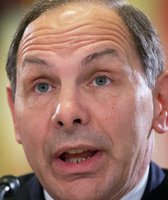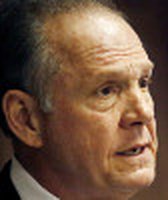Get PolitiFact in your inbox.

U.S. Senator Mark Udall and U.S Rep. Cory Gardner debate in Colorado Saturday, Sept. 6, 2014.
Editor’s note: Today we look at the race for U.S. Senate in Colorado. It's the third in a series of stories about our fact-checks in closely contested Senate races. Our previous installments looked at the races in Arkansas and Alaska.
Of the states with toss-up Senate races in 2014, Colorado had the tightest result in the 2012 presidential election. Then, President Barack Obama topped Republican Mitt Romney 51 percent to 47 percent, one of his narrowest victories en route to re-election.
Colorado remains a true purple state heading into the midterm elections. The race between Democratic Sen. Mark Udall and Republican challenger U.S. Rep. Cory Gardner is tight, with the most recent polls giving the incumbent a slight advantage.
Udall, who first won election to the Senate on a Democratic wave in 2008, has sought to define Gardner early in the race as emblematic of House Republicans and close to the far right on issues like abortion. Gardner, in his first statewide campaign, has looked to broaden his appeal by avoiding anti-immigration rhetoric and by renouncing his support for contentious personhood legislation.
Women’s health has been a dominant theme on the airwaves, and at the center of many of our fact-checks of the race so far.
Most recently, we reviewed an ad from the Gardner campaign on contraceptives. In the 30-second spot, Gardner outlined a populist plan to make the pill available over-the-counter without a prescription. He claimed the proposal is "cheaper and easier for you" than Udall’s "plan," which is essentially the Affordable Care Act.
But Obama’s healthcare law requires insurance companies to cover FDA-approved contraceptives — not just the pill — without cost-sharing. While there is some evidence that moving drugs over-the-counter has economic benefits, the Gardner campaign couldn’t prove that those incentives outpace the savings for consumers in the Affordable Care Act.
Ultimately, there was a lot of uncertainty and experts — from advocates to economists — questioned whether Gardner’s proposal would be cheaper for most consumers. And Gardner’s plan would only address one type of contraceptive, meaning the people who choose other methods of birth control would see higher costs. The statement earned a Mostly False.
On the flip side, Udall went after Gardner’s record on contraceptives early in the race, claiming in an ad that his Republican opponent "championed" a "crusade" to ban birth control in Colorado.
The claim centers around Gardner’s past support for so-called personhood legislation that gives a fetus the same rights as a person from the moment of fertilization. Interestingly, Gardner admitted earlier this year that the bill, if passed, could have outlawed certain birth controls and renounced his support.
But legal experts are mixed on the impact of the legislation. While it could potentially affect some forms of birth control, it certainly wouldn’t ban all of them, and efforts to pass personhood have been unsuccessful, so we don’t know how courts would interpret it. The effort is probably more accurately described as a fight against abortion than against birth control. "Championed" is also a strong word to describe Gardner’s role, since it implies that he was a leader in the cause, which is debatable. So we rated Udall’s statement Half True.
Also addressing personhood, the Democratic Senatorial Campaign Committee claimed in an ad that "Cory Gardner is sponsoring a bill to ban all abortions right now." It’s clear that personhood bills are anti-abortion measures, but there’s a lot of uncertainty in the bill’s language that would have to be sorted through, over time, by the court system, and it’s not clear that it would ban all abortions. We rated it Half True.
Colorado is the only competitive Senate race with a sizeable Latino voting population. The Service Employees International Union aired a Spanish-language ad that claimed Gardner "blocked immigration reform" and "voted to deport our DREAMers." Gardner, though, has repeatedly advocated for his House colleagues to take up immigration legislation. And while he did vote for an amendment that effectively would have ended Obama’s two-year delay in deporting certain children of illegal immigrants (he also once voted against it), he said that was a move against Obama’s unilateral action, and not the DREAMers. Indeed, he has actually called for permanent status for children brought to the U.S. illegally, including citizenship for those who join the military. We rated SEIU’s claim Mostly False.
In his appeal to Hispanic voters in July, Gardner shifted to the economy. On a Spanish-speaking radio network, he claimed, "We would create thousands of jobs in Colorado if the Keystone Pipeline were to be built." But Colorado is not on the pipeline’s path, which would connect Western Canada to Nebraska and then Gulf Coast refineries, so we were skeptical of the claim. We learned that Gardner was relying on an old study that measured the overall impact of the Alberta oil sands on the U.S. economy, not the Keystone XL pipeline specifically. The State Department study cited by the company building the pipeline estimated that the equivalent of 30,000 direct, indirect and induced temporary jobs would be created in states outside the pipeline’s projected route. However, it doesn’t specify how many of those would be created in Colorado. We rated the statement Mostly False.
On the Affordable Care Act, Gardner has repeatedly voted to repeal Obama’s signature domestic achievement and early in the race was critical of Udall for supporting it. But he went too far — as many Republican Senate challengers have — when he said Udall "decided Obamacare. ... He passed Obamacare with his vote." Scrutinized literally, Udall was not among the Democrats that Senate Majority Leader Harry Reid had to whip hard to finally vote for the healthcare bill. Beyond that, the statement also ignores the other 59 senators who also voted to end debate — and the exact same thing could be said about them. So it’s Mostly False.
Our Sources
See individual fact-checks for complete sources.
























































